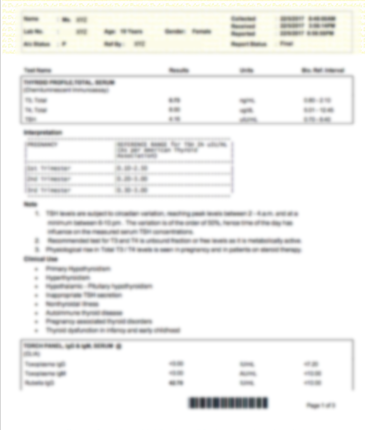Magnesium
- C1132
Rs 380
- Why Get Tested?
- When To Get Tested?
To evaluate the level of magnesium in your blood and to help determine the cause of abnormal levels of magnesium, calcium and/or potassium - Sample Type:SERUM (SST or Plain)
- Fasting :YES (10 to 12 Hours)
- Report Delivery:within 48 Hrs of Test Schdule
- Components:1 Observations
- Also Known As:
Magnesium - Formal Name:
Mg Mag - Sample Instructions:
When you have symptoms such as weakness, irritability, cardiac arrhythmia, nausea, and/or diarrhea that may be due to too much or too little magnesium; when you have abnormal calcium or potassium levels; when magnesium is given for medical treatment - Test Preparation Needed?
A blood sample drawn from a vein in your arm; sometimes a timed urine collection that most often requires a 24-hour sample collection - What Is Being Tested?
For a blood sample, overnight fasting may be required; follow any instructions that you are given. - How Is It Used?
Magnesium is a mineral that is vital for energy production, muscle contraction, nerve function, and the maintenance of strong bones. It comes into the body through the diet and is absorbed by the small intestine and colon. Magnesium is stored in the bones, cells, and tissues. Normally, only about 1% of total body magnesium is present in the blood and this makes it difficult to get an accurate measurement of total magnesium content from blood tests alone. However, this test is still useful for evaluating a person's magnesium status. A wide variety of foods contain small amounts of magnesium, especially green vegetables such as spinach, as well as whole grains and nuts. Foods that have dietary fiber are usually also sources of magnesium. The body maintains its magnesium level by regulating how much it absorbs and how much it excretes or conserves in the kidneys. Magnesium deficiencies (hypomagnesemia) may be seen with malnutrition, conditions that cause malabsorption, and with excess loss of magnesium by the kidneys. Magnesium excess (hypermagnesemia) may be seen with the ingestion of antacids that contain magnesium and with decreased ability of the kidneys to excrete magnesium. Someone with mild to moderate magnesium deficiency may have no or few nonspecific symptoms. Persistent or severe deficiencies can cause nausea, loss of appetite, fatigue, confusion, muscle cramps, seizures, changes in heart rate, and numbness or tingling. They can also affect calcium metabolism and exacerbate calcium deficiencies. Symptoms of excess magnesium can be similar to those of deficiency and include nausea, muscle weakness, loss of appetite, and an irregular heart rate. - When Is It Ordered
A magnesium test is used to measure the level of magnesium in the blood (or sometimes urine). Abnormal levels of magnesium are most frequently seen in conditions or diseases that cause impaired or excessive excretion of magnesium by the kidneys or that cause impaired absorption in the intestines. Magnesium levels may be checked as part of an evaluation of the severity of kidney problems and/or of uncontrolled diabetes and may help in the diagnosis of gastrointestinal disorders. Since a low magnesium blood level can, over time, cause persistently low calcium and potassium levels, it may be checked to help diagnose problems with calcium, potassium, phosphorus, and/or parathyroid hormone – another component of calcium regulation. Magnesium levels may be measured frequently to monitor the response to oral or intravenous (IV) magnesium supplements. The test for magnesium may be ordered, along with calcium and phosphorus testing, to monitor calcium supplementation. - What Does The Test Result Mean?
Magnesium testing may be ordered as a follow up to chronically low blood levels of calcium and potassium. It also may be ordered when a person has symptoms that may be due to a magnesium deficiency, such as muscle weakness, twitching, cramping, confusion, cardiac arrhythmias, and seizures. Magnesium depletion is known to be linked to severe alcohol intake or due to irregular or bad absorption of magnesium in the intestine. A healthcare practitioner may order a magnesium level to check for a deficiency as part of an evaluation of malabsorption, malnutrition, diarrhea, or alcoholism. When someone is taking medications that can cause the kidneys to excrete magnesium, testing may be performed as well. When magnesium and/or calcium supplementation is necessary, the level of magnesium in the blood may be checked at intervals to monitor the effectiveness of treatment. When an individual has a kidney disorder or uncontrolled diabetes, a magnesium test may be ordered periodically, along with kidney function tests such as a BUN and creatinine, to help monitor kidney function and to make sure that the person is not excreting or retaining excessive amounts of magnesium. - Is There Anything Else I Should Known?
Low blood levels of magnesium may indicate that a person is not consuming or absorbing enough magnesium or is eliminating too much from the body. Decreased magnesium levels are typically seen with: Low dietary intake, which may be seen in the elderly, people who are malnourished or those with alcoholism Digestive disorders (such as Crohn disease) Uncontrolled diabetes Hypoparathyroidism Long-term diuretic use Prolonged diarrhea Post-surgery Severe burns Pre-eclampsia High blood levels of magnesium are rarely due to dietary sources but are usually the result of excessive supplementation or a problem with eliminating it from the body. Increased magnesium levels are seen in: End-stage renal disease (ESRD) Hyperparathyroidism Hypothyroidism Dehydration Diabetic acidosis (when first seen) Addison disease Use of magnesium-containing antacids or laxatives
Frequently Booked Test
Absolute Eosinophil Count
-
C1214
-
5-a-Dihydrotestosterone (5a DHT)
-
within 72 Hrs of Test Schdule
₹ 350.00
Absolute Eosinophil Count
-
C1214
-
5-a-Dihydrotestosterone (5a DHT)
-
within 72 Hrs of Test Schdule
₹ 350.00
Absolute Eosinophil Count
-
C1214
-
5-a-Dihydrotestosterone (5a DHT)
-
within 72 Hrs of Test Schdule
₹ 350.00
